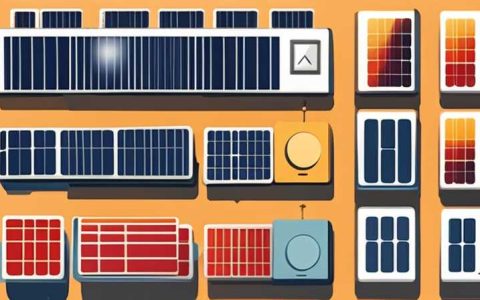
Opening a solar energy shop involves several critical steps: 1. Conducting market research to understand local demand and competition, 2. Securing financing and investment to support startup costs, 3. Finding a suitable location with high visibility and accessibility, 4. Obtaining necessary permits and licenses to operate legally. An in-depth analysis of local regulations will help you navigate through legal requirements effectively.
UNDERSTANDING THE SOLAR ENERGY MARKET
The solar energy industry has experienced substantial growth in recent years, largely due to increasing awareness of climate change and a shift toward renewable energy sources. This burgeoning sector offers a lucrative opportunity for entrepreneurs seeking to capitalize on growing consumer demand for clean energy solutions. In navigating this market, several factors must be considered, including market dynamics, customer needs, and emerging trends.
The demand for solar energy solutions has surged, driven by technological advancements that have decreased the costs of solar panels and associated equipment. As consumers become more eco-conscious, they are drawn to sustainable energy solutions, making solar power an appealing option for residential and commercial energy needs. Potential shop owners must evaluate local and regional market conditions to tailor their offerings effectively. This includes understanding potential customer demographics, their motivations for adopting solar energy, and awareness levels regarding available alternatives. By studying the competition in the area, aspirants can carve a niche that sets them apart from other businesses.
Additionally, government incentives and policies significantly influence the solar energy market. Numerous regions offer tax credits, rebates, and financing options promoting solar adoption. Given the multifaceted nature of these benefits, it’s essential for prospective shop owners to stay informed about the legislative landscape affecting renewable energy. Knowing how to navigate these incentives can greatly enhance the appeal of a solar energy shop and lead to increased customer engagement.
DEVELOPING A BUSINESS PLAN
Creating a thorough business plan serves as the blueprint guiding the establishment and growth of a solar energy shop. This comprehensive document outlines the shop’s vision, goals, and strategies, ensuring a clear path forward. A well-crafted plan should encompass several key components, including market analysis, organizational structure, product offerings, marketing strategies, financial projections, and a contingency plan for potential challenges.
Market analysis provides insights into both opportunities and threats, allowing entrepreneurs to position their shop strategically. By identifying the target market, business owners can determine which products or services will appeal most to potential customers. This analysis should also include a thorough evaluation of competitors and their market share. With this understanding, shop owners can implement strategies that differentiate their offerings, such as superior customer service, product variety, or educational resources to inform customers about solar energy.
Another critical element is the financial aspect of the business plan. This includes estimating startup costs, projected revenue, and outlining funding sources. Entrepreneurs must keep in mind expenses such as inventory, rent, utilities, marketing, payroll, and equipment. Preparing a realistic financial scenario, inclusive of break-even analysis, will aid in obtaining investments and loans, essential for covering upfront costs. Lastly, a contingency plan addressing potential risks will show investors that the entrepreneur has prepared for uncertainties inherent in start-up operations.
NAVIGATING LEGAL REQUIREMENTS
Starting a solar energy shop requires compliance with various legal requirements and regulations. This process may seem overwhelming, but thorough research and adherence will ensure smooth operations and legal protection. Familiarity with local, state, and federal regulations governing solar energy businesses is paramount. Potential shop owners should take the time to understand zoning laws, business licenses, and environmental regulations that may apply to their operation.
Obtaining the necessary permits to operate is essential. Depending on the region, these can include building permits, business licenses, health and safety permits, and others relevant to the renewable energy sector. By approaching local authorities and regulatory bodies, aspiring business owners can obtain a clear list of required documentation, timelines, and associated fees. Developing a timeline to fulfill these requirements promptly will illustrate diligence and seriousness to potential investors and consumers.
Additionally, understanding consumer protection laws is crucial when selling solar products and services. Customers may have specific rights concerning warranties, service agreements, and product returns, particularly with substantial investments in solar technology. Educating staff on these legal aspects will ensure compliance and enhance the shop’s reputation, establishing trust with consumers. Ensuring transparency about the benefits and costs associated with solar products fosters a positive customer relationship, encouraging repeat business and referrals.
ESTABLISHING A SUPPLY CHAIN
Establishing a reliable supply chain is essential for a solar energy shop’s success. The quality and availability of solar panels, inverters, and additional equipment can significantly influence customer satisfaction and business profitability. Building relationships with reputable suppliers ensures that the shop can maintain consistent inventory levels and stay competitive in pricing. Moreover, considering various aspects of supply chain management will help in creating an efficient and effective operational model.
Selecting the right suppliers involves evaluating their product quality, reliability, and financial stability. Researching manufacturer reviews, and assessing certifications and warranties will provide insight into vendor credibility. A diverse supplier base can safeguard against market fluctuations and potential shortages, allowing the shop to adapt quickly to changes in demand or supply disruptions.
Shipping and logistics are crucial components of the supply chain that can directly impact a shop’s operations. Navigating shipping logistics efficiently not only ensures timely delivery of equipment but also minimizes costs related to transportation. Collaborating with logistics experts specializing in renewable energy products may streamline operations, leading to significant time savings. An efficient supply chain promotes better inventory management, reducing excess stock while maintaining sufficient supplies to meet customer demands.
CRAFTING A MARKETING STRATEGY
Devising an effective marketing strategy is vital for attracting customers to a solar energy shop. Marketing plays a significant role in creating awareness, generating leads, and converting prospects into loyal customers. The marketing plan should encompass various channels and tactics, including digital marketing, community engagement, and informative workshops to educate consumers about the benefits of solar energy.
Digital marketing offers robust opportunities for engagement and visibility, particularly through social media, search engine optimization (SEO), and targeted ads. By creating informative content that resonates with the target market’s interests and needs, businesses can position themselves as reliable sources of information. Engaging with potential customers through platforms like Facebook, Instagram, and LinkedIn can significantly enhance brand recognition and loyalty. Additionally, optimizing the shop’s website for local SEO will improve visibility in search engine results, drawing in more customers searching for solar solutions.
In tandem with digital efforts, community engagement can foster strong relationships and trust with local residents. Sponsorship of community events, participation in local fairs, and collaborations with environmental organizations help establish credibility while promoting the shop’s mission. Hosting free workshops to educate potential customers about solar energy’s advantages will empower consumers to make informed decisions regarding their energy needs. By cultivating a strong community presence, solar energy shops can build lasting customer relationships, leading to increased referrals and overall business growth.
DEVELOPING CUSTOMER RELATIONSHIPS
Building robust relationships with customers is a crucial aspect of maintaining a successful solar energy shop. Establishing trust and open communication fosters loyalty, encouraging repeat business and invaluable word-of-mouth referrals. Thus, implementing strategies that promote strong customer relationships can be instrumental in achieving long-term success.
The first step in developing customer relationships lies in delivering exceptional service. Providing knowledgeable staff who can effectively communicate product benefits, installation processes, and financing options will create a positive customer experience. By actively listening to customer concerns, shop owners can tailor their offerings to better match expectations. Moreover, remaining transparent throughout the sales process ensures that customers feel supported and valued rather than merely viewed as sales opportunities.
After initial customer interactions, implementing initiatives to maintain engagement can further strengthen relationships. This can include follow-ups after purchase, offering maintenance services, or sending newsletters with updates on solar technology innovations and community solar initiatives. Building a community around the brand also encourages customers to feel a sense of belonging, highlighting the long-term environmental mission they share with the shop. By creating a vibrant community atmosphere, local solar energy shops can cultivate enduring customer loyalty while contributing positively to the environment and society.
MONITORING PERFORMANCE AND ADAPTING
Once the solar energy shop is operational, monitoring its performance will be crucial to its continued success. Understanding key performance indicators (KPIs) allows business owners to evaluate their operational efficiency and make necessary adjustments. This ongoing analysis involves scrutinizing sales figures, customer feedback, and market trends, helping the business adapt proactively to changes.
Identifying key performance indicators is essential for assessing business efficiency. Metrics such as monthly sales growth, customer acquisition costs, and customer satisfaction scores provide invaluable insights into operational performance. Regularly reviewing these indicators enables shop owners to recognize areas needing improvement, allowing actionable decisions based on data rather than intuition. Furthermore, employing customer relationship management (CRM) systems can streamline the management of this data, ensuring all relevant information is easily accessible.
Adapting strategies based on performance data is fundamental in the highly dynamic solar energy market. Trends and customer preferences may shift rapidly, requiring the shop to pivot or diversify its offerings. By remaining agile and responsive, business owners can stay ahead of competition and maintain relevance within the industry. Continuous training for staff, investing in new technology, and expanding product lines can all contribute to sustained growth and profitability.
FAQs
WHAT INITIAL INVESTMENTS ARE NECESSARY TO OPEN A SOLAR ENERGY SHOP?
Initiating a solar energy shop demands careful financial planning, as several key investments are necessary for successful operations. The most substantial expenses include securing a retail location, refurbishing the space, acquiring inventory, marketing, and operational costs. Often, the retail space needs adequate renovations to create an inviting atmosphere, which could involve aesthetic improvements and necessary technologies for efficient operations. Depending on the location, this investment could vary significantly.
Purchasing inventory of solar panels, inverters, and accessories presents another significant expense. Establishing relationships with reliable suppliers ensures a robust inventory that meets customers’ needs. Additionally, implementing a strong marketing strategy is essential to generating awareness about the shop. This should encompass both online and offline campaigns to attract potential customers. Lastly, considering operational costs like employee salaries, utility bills, insurance, and permits are crucial in budgeting, ensuring the business remains financially viable.
HOW CAN I STAY UPDATED ON SOLAR ENERGY TRENDS AND INNOVATIONS?
Continuous education is vital for maintaining a competitive edge in the rapidly evolving solar energy sector. Attending industry conferences, workshops, and training sessions allows business owners and staff to stay informed about emerging technologies, regulatory changes, and market trends. Additionally, subscribing to reputable solar energy publications and online platforms can deliver valuable insights.
Leveraging digital platforms such as webinars, podcasts, and blogs enables solar shop owners to access information from industry experts and peers. Engaging in social media groups dedicated to solar energy fosters a community of shared knowledge, where members actively discuss trends and innovations. It’s essential to monitor policy changes and available incentives that might impact business operations, ensuring that the shop remains adaptable amidst the industry’s dynamic landscape.
WHAT STRATEGIES CAN BE IMPLEMENTED TO ATTRACT CUSTOMERS TO MY SOLAR ENERGY SHOP?
To attract customers effectively, a multi-faceted approach is essential. A strong online presence is critical; thus, implementing search engine optimization (SEO) tactics will increase visibility, ensuring potential customers find the shop during their online searches. Furthermore, engaging in targeted advertising on popular social media platforms can significantly enhance outreach.
Beyond digital strategies, community engagement initiatives can substantially boost customer interest. Participating in local environmental events, offering informative workshops, or hosting clean energy seminars creates meaningful connections with potential customers. These activities showcase the shop’s commitment to supporting renewable energy initiatives while empowering customers with knowledge about solar energy benefits. Additionally, offering promotions or referral incentives can garner attention and generate positive word-of-mouth, encouraging a broader customer base.
An open and fully operational solar energy shop represents an opportunity for entrepreneurship and advocacy for renewable energy. Careful preparation in understanding the market, laying out a robust business plan, adhering to legal standards, establishing sound supplier relationships, crafting a unique marketing strategy, and nurturing customer connections are paramount to success. Only through diligent monitoring and adaptation can a business thrive in this evolving industry. Grasping the essentials of running a solar energy shop not only contributes to financial viability but significantly impacts the wider mission of promoting sustainable energy for future generations.
Original article by NenPower, If reposted, please credit the source: https://nenpower.com/blog/how-to-open-a-solar-energy-shop/











